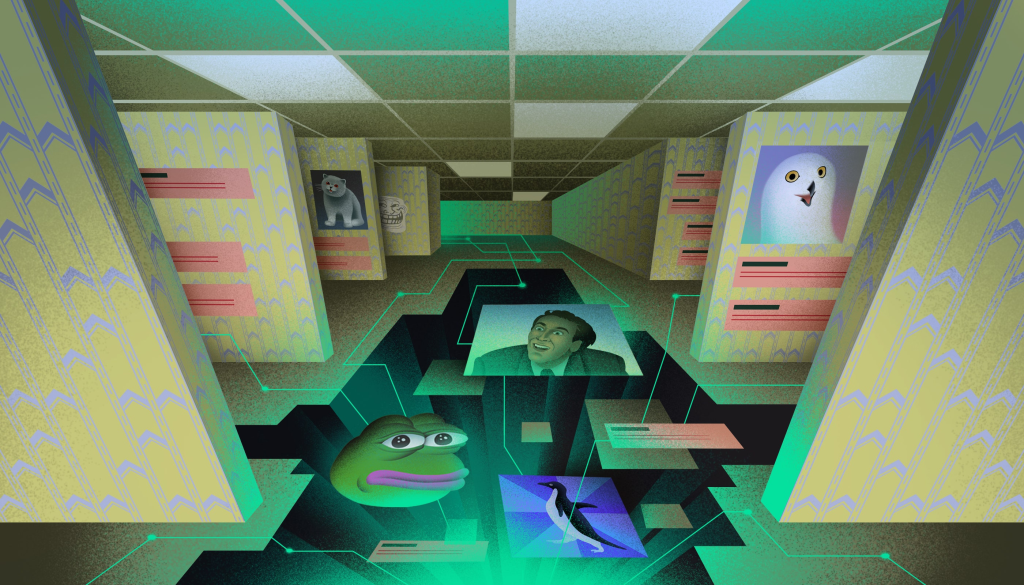4chan has long stood as a polarizing figure in the annals of internet history, emerging as a notorious hub for edgelord culture and unrestrained expression. Founded in 2003 by Christopher Poole, 4chan built its foundation on the principles of anonymity and a laissez-faire approach to content, making it a fertile ground for everything from memes to radical ideologies. As social media platforms evolved, 4chan initially thrived in an environment where its unfiltered conversations and often controversial posts remained largely unwelcome in mainstream digital forums. This unique space fostered a tight-knit 4chan community that engaged in a blend of humor, outrage, and shock, shaping a new kind of interactive discourse. However, with the rise of other platforms dabbling in similar content, the relevance of 4chan began to wane, leaving many to question its place in the vast landscape of modern social media and digital culture as a whole.
The infamous online message board known as 4chan has gained recognition among internet enthusiasts and casual users alike as a breeding ground for uncensored dialogue and provocative content. Often considered a digital equivalent to niche forums or even ‘edgelord’ hotspots, 4chan provided a veil of anonymity that encouraged free expression, regardless of its controversial nature. Originally inspired by Japanese image boards, this platform polarized communities through its unabashed discussion of sensitive topics and memes that resonated across various social networks. As the digital landscape shifted, other forums began to adopt similar practices, challenging 4chan’s reign and transforming the nature of online discourse in unpredictable ways. Today, while it still holds a place in the hearts of some, the infamous forum faces staunch competition from emerging platforms adapting to the new social media paradigm.
The Rise and Fall of 4chan: A Historical Overview
4chan’s inception in 2003 marked the beginning of an era for internet forums, providing a space for anonymous posting that was both liberating and fraught with controversy. Founded by Christopher Poole, or “moot,” the site quickly became a gathering place for those seeking unfiltered expression, free from the constraints imposed by mainstream social media. This anonymity catalyzed the development of a unique identity among its users, who embraced the site’s culture of edgelord content—often pushing the boundaries of societal norms and acceptability. In its heyday, 4chan thrived under an ethos of chaotic camaraderie that appealed to a generation of internet users dissatisfied with the polished environments of platforms like Facebook and Instagram.
However, as the landscape of digital communication shifted during the 2010s, 4chan’s relevance began to wane. With the advent of social media giants, the platform found itself overshadowed and increasingly viewed as an antiquated relic of the internet. While other forums evolved to accommodate the growing appetite for meme culture and virality, 4chan remained trapped in its original framework. This stagnation was punctuated by the sale of the site in 2015, raising questions about its future direction and the sustainability of its community as more versatile platforms emerged.
4chan and Social Media: A Complex Relationship
The intersection of 4chan and mainstream social media represents a complicated dichotomy between freedom of expression and social responsibility. In its early days, 4chan provided an essential space for discussion and dissent that celebrated edgy humor and subculture. Users felt liberated; they could express radical or controversial viewpoints that would be swiftly censored on platforms like Twitter or Facebook. This environment nurtured not only creativity but also the controversial edgelord culture that became synonymous with the website. The influence of 4chan’s culture can still be observed today, as social media platforms increasingly mirror its unfiltered style, albeit often without the protective veil of complete anonymity.
Yet, as the internet evolved, societies began to recognize the detrimental effects of unmoderated platforms. The same functionalities that once empowered 4chan’s users now left a fertile ground for hate speech and extremist ideologies, fostering a backlash against unrestricted expression. With growing concerns regarding online safety, social media companies have strived to implement more stringent moderation policies. Despite this, the radical discourse that originated on 4chan trickled into these networks, leading users to question the balance between freedom and accountability in an increasingly interconnected digital society.
Understanding Edgelord Culture and Its Origins
Edgelord culture, characterized by an embrace of dark humor and transgressive content, has roots deeply embedded in the fabric of 4chan’s identity. Originating from the site’s anonymous nature, users adopted a ‘shock for shock’s sake’ mentality, crafting an environment where offensive jokes were commonplace. This culture encouraged a form of performance art where users pushed the boundaries of taste to elicit reactions. In many ways, this early edgelord ethos was a reaction to the politically correct climate emerging on other platforms, appealing to those who felt stifled by conventional societal norms.
However, the impact of edgelord culture extends beyond just humor; it has shaped the way communities interact and discuss contentious topics online. The rapid-fire style of 4chan’s threads, where users compete for the most outrageous content, laid the groundwork for the meme-centric engagement we see in social media today. This competition spurred an evolution of content sharing that has both entertained and polarized communities. Yet, as the lines between humor and hate blur, the responsibility for addressing the ramifications of such expression grows increasingly urgent.
The 4chan Community: A Unique Digital Subculture
Despite its controversies, the 4chan community embodies a distinctive subculture that thrives on its social fabric of anonymity and shared experiences. Users partake in a collective identity, often rallying around inside jokes, memes, and collaborative projects. This environment fosters creativity and allows for an unfiltered exchange of ideas and opinions, albeit within a landscape often marred by toxic behaviors and extremist content. The bonds formed among users facilitate a strong sense of belonging, providing a haven for those who feel ostracized by mainstream society.
The community’s resilience is evident even in the face of adversity, such as the site’s recent hack and temporary shutdown. The declaration that “4chan is back” post-hack reinforces the tenacity and loyalty of its users, reminding them that no other platform can replicate the raw energy and cultural weight of 4chan. This lack of replacement has solidified its place as a digital playground where users can navigate the tricky waters of social commentary, humor, and shared frustrations in a space uniquely their own.
The Impact of 4chan on Modern Internet Culture
4chan’s influence on modern internet culture is undeniable, shaping the landscape of online interaction in ways both positive and negative. It conceptualized the idea of anonymity as a catalyst for creativity, giving rise to viral content, memes, and internet slang that permeate platforms today. The real-time engagement and the sheer spontaneity that characterized 4chan’s threads set a precedent for how content is created and consumed on social media. Furthermore, the acceleration of digital communication initiated by 4chan—where imagery and words blend almost seamlessly—has revolutionized digital expression across various platforms.
However, this impact comes with significant caveats. The proliferation of toxic elements, including hate speech and rampant trolling, has also been a product of 4chan’s ethos. As users embrace the chaos of online discourse, we witness the rapid dissemination of harmful ideologies and misinformation that can escalate into real-world consequences. Consequently, the balance between innovation and accountability remains a central theme in discussions about the legacy of 4chan and its ongoing influence on the digital age.
The Future of 4chan: Adapting or Fading Away?
As the digital landscape continues to evolve, the future of 4chan hangs in a precarious balance. The site’s recent challenges, coupled with shifts in user behavior towards more secure and private communication channels, leave its longevity in question. While some users remain loyal, drawn to the site’s unregulated nature, others have migrated to newer platforms seeking safer environments for their discussions. The site’s struggle to adapt its infrastructure while retaining its core identity poses a significant obstacle in fulfilling its original promise of being a bastion of uncensored expression.
Moreover, 4chan’s ability to reclaim its influence hinges on its willingness to confront the implications of its legacy. Without a sincere commitment to evolve with the changing tides of internet culture, the site risks becoming a mere echo of its former self. Ultimately, 4chan stands at a crossroads—either adapting to meet the new digital ethics demanded by users or fading into obscurity as online radicalization increasingly shifts towards more private and encrypted platforms.
4chan’s Legacy of Innovation in Digital Discourse
The legacy of 4chan transcends its immediate controversies, embodying a period of digital innovation and experimentation in online discourse. The forum pioneered forms of expression that embraced playfulness and irreverence, laying the groundwork for how communities engage in discussions today. From generating memes that define cultural moments to influencing language and interaction styles on platforms like Reddit and X, 4chan’s essence lives on in the core dynamics of online communication—resulting in a blending of humor, sarcasm, and social commentary that resonates widely across generations.
This pioneering spirit necessitates a critical examination of how such platforms can foster healthier dialogues while maintaining the freedom of expression central to their founding principles. As digital communication grows increasingly complex, harnessing the positive aspects of 4chan’s legacy—creativity, engagement, and spontaneity—will be essential in shaping future internet cultures. Balancing these elements against the need for accountability and moderation will determine the evolution of online discourse in years to come.
Lessons from 4chan: Navigating the Future of Internet Forums
As we reflect on the lessons gleaned from 4chan, navigating the future of internet forums requires a comprehensive understanding of the dynamics at play within these digital spaces. The site illustrated how anonymity can empower creativity while also enabling harmful behaviors that disrupt online communities. In this evolving landscape, forums need to balance the need for expression with the responsibility of managing discourse, ensuring that all voices are heard while mitigating the spread of toxic ideologies.
In essence, the future of forums like 4chan will depend on their ability to adapt and innovate in response to the challenges posed by a more interconnected and politically charged digital environment. By harnessing the positive aspects of anonymity while instituting necessary safeguards, forums can cultivate inclusive communities that reflect the diverse perspectives of their users. Ultimately, striking this balance will be paramount in ensuring that platforms like 4chan contribute positively to the broader internet ecosystem for generations to come.
Frequently Asked Questions
What is the history of 4chan and its impact on internet culture?
4chan, founded in 2003 by Christopher Poole, originally mirrored the Japanese 2channel format, allowing anonymous users to post a variety of content, including text and images. It became a hub for edgelord culture, serving as a precursor to the meme and trolling phenomena observed across social media today. 4chan’s influence on the evolution of internet forums and collective humor established a unique digital culture that resonates even in contemporary platforms.
How does 4chan differ from modern social media platforms?
Unlike modern social media that typically promotes user identities and curates content, 4chan fosters complete anonymity, allowing users to participate without attachment to personal branding. This environment cultivates raw, unfiltered interactions, which have become significantly less tolerated on mainstream platforms due to community guidelines, leading to the rise of 4chan as a sanctuary for edgelord content.
What role does 4chan play in the modern online community?
4chan plays a complex role in today’s online ecosystem; while it has lost some relevance against newer platforms, it remains a cornerstone for certain communities that favor unmoderated discussions. Its legacy is evident in the way other sites now handle meme culture and online discourse, contributing to the development of communication styles that emphasize humor and provocation.
Why is 4chan often associated with controversial content and extremist movements?
4chan has gained notoriety for harboring controversial content, including extremist movements and ideologies. Its anonymity allows users to express extreme views without accountability, making it a breeding ground for incel culture, hate speech, and radical ideologies that have spilled over into mainstream discussions on social media.
How did the 4chan community react to major events, such as its hacking incident?
The 4chan community displayed resilience after its hacking incident in April 2025, which temporarily took the site offline and exposed vulnerabilities. The return of 4chan was met with mixed emotions, including embarrassment about the breach. However, the community reaffirmed its identity, emphasizing that no platform could replicate its unique culture and collective spirit, marking a significant moment in its history.
What does the future hold for 4chan in the evolving landscape of social media?
While 4chan could potentially reclaim its former status as a nucleus for radicalization, the rise of private platforms for extremism poses a challenge. As digital communication shifts to encrypted apps, 4chan’s relevance may shift as well but its cultural implications will likely persist as part of the broader internet narrative.
| Key Point | Description |
|---|---|
| Origins of 4chan | Founded in 2003 by Christopher Poole, inspired by Japanese message boards, it became a hub for anonymous, unfiltered content. |
| Censorship and Infamy | Known for content that led to its ban on many public networks, reflecting its controversial nature. |
| Cultural Impact | Crucial in shaping meme culture and online discourse, influencing platforms like X and TikTok. |
| Decline in Relevance | As other platforms emerged, 4chan’s influence waned, though it retained a loyal niche community. |
| Hacking Incident | In 2023, 4chan was hacked, leading to a leak of its source code and renewed scrutiny of its relevance. |
| Current Status | Despite challenges, the site maintains a presence, though its utility for radicalization has shifted to private platforms. |
Summary
4chan, once a central hub for edgy internet culture, has struggled to keep pace with the broader social media landscape that has absorbed its once unique traits. While it remains a significant piece of digital history, its current status reflects how the internet’s evolution has left it in a marginalized role, as new platforms cater more effectively to the same audience. Today, the edgelord humor and radical dialogues that once thrived on 4chan are widely replicated, making it just one of many spaces for such discourse, rather than a definitive voice. This evolution underscores how 4chan’s legacy interacts with an internet that has become both more accepting and more fragmented.



